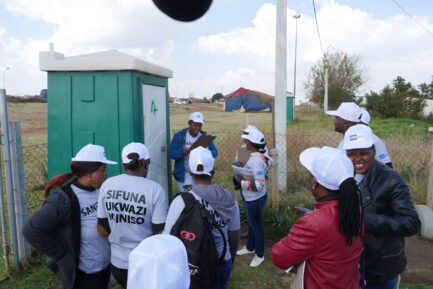Our advocacy for clean water and dignified sanitation in informal settlements in the City of Ekurhuleni (CoE) continues.
The community of Langaville forms part of the Ekurhuleni Informal Settlement Movement. This is a Cluster of Community Agency made up of informal settlements communities in the CoE, which have a strategic partnership with Planact.
Recently, the hopes of the 750-household affected by chemical toilets in the Langaville informal settlement in Tsakane, CoE, were crushed after losing a court case against the CoE. The residents were seeking to have the area rezoned for residential use and to have access to adequate sanitation facilities in the forms of flushing toilets. This loss will have effect beyond Langaville.
Planact supported the case as it strengthened the advocacy efforts for improved sanitation across the municipality. At one point, Planact set up a projector in a hall to facilitate access to online court proceedings for the residents. The judgement is a setback, however, the campaign for dignified sanitation will continue through alternative strategies and tactics.
Currently, the Langaville community uses chemical toilets, a short-term measure provided by the CoE as a minimum municipal requirement for sanitation, but residents have complained about the harm that this service is placing on the health of communities.
Planact’s scaled-up social audit on sanitation in all ten informal settlements in the CoE in 2018 found strong evidence of insufficient monitoring of the delivery of the service by the Ekurhuleni Water and Sanitation Operations Department. Moreover, an amaBhungane investigation revealed that the Ekurhuleni metro spent a staggering R1.9 billion on chemical toilets over three financial years from 2017 to 2019.
Despite having lost their case, in their application, residents sought relief from the court on these issues:
- compelling the CoE to re-zone even 4652, 4710 and 4735 to residential status.
- reviewing and setting aside the CoE’s decision to continue to provide interim sanitation services in the form of temporary portable chemical toilets.
- obtaining a declaration that the CoE has failed to meet its constitutional obligations to provide proper sanitation to the applicants and other residents who live in the area; and by
- compelling the CoE, by way of declaratory relief and a mandamus (declaratory order), to provide alternatives to the chemical toilets currently being provided.
The residents argued that it was unconstitutional to expect them to use these under-serviced, over-utilised, unsafe and unhealthy forms of sanitation indefinitely.
The municipality had supplied the chemical toilets via private companies as a “temporary” measure, for more than twelve years. Therefore, the effect of this judgment is that the provision of chemical toilets will now continue indefinitely. The judgement is a setback not only for the Langaville residents but all who live in informal settlements in the CoE, and probably beyond.
At a meeting with residents together with their legal representatives and the CoE, it was agreed that the delivery of sanitation in its current form will be monitored by residents and the Department of Water and Sanitation. It was further agreed that the Department of Human Settlements would arrange to assist qualifying residents in registering on the housing database for access to units at the John Dube Megaproject development. In short, relocation, and not upgrading, is the only option on offer for the residents under the present circumstances.
Background to the Langaville case:
In 2011, residents successfully applied to the court to grant relief that the CoE should uphold the right to sanitation. The court ruled in their favour. Soon theatre, the CoE began to provide sanitation in the form of temporary portable chemical toilets. The South African Human Rights Commission intervened in 2019 by recommending to the CoE for the rezoning of the land that the residents currently occupy, but the CoE rejected the recommendation.

